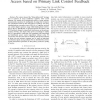Free Online Productivity Tools
i2Speak
i2Symbol
i2OCR
iTex2Img
iWeb2Print
iWeb2Shot
i2Type
iPdf2Split
iPdf2Merge
i2Bopomofo
i2Arabic
i2Style
i2Image
i2PDF
iLatex2Rtf
Sci2ools
110
click to vote
INFOCOM
2010
IEEE
2010
IEEE
Distributed Power Control for Cognitive User Access based on Primary Link Control Feedback
—We venture beyond the “listen-before-talk” strategy that is common in many traditional cognitive radio access schemes. We exploit the bi-directional nature of most primary communication systems. By intelligently choosing their transmission parameters based on the observation of primary user (PU) communications, secondary users (SUs) in a cognitive network can achieve higher spectrum usage while limiting their interference to the PU. Specifically, we propose that the SUs listen to the PU’s feedback channel to assess their interference on the primary receiver (PU-Rx), and adjust radio power accordingly to satisfy the PU’s interference constraint. We investigate both centralized and distributed power control algorithms without active PU cooperation. We show that the PU feedback information inherent in many two-way primary systems can be used as important coordination signal among multiple SUs to distributively achieve a joint performance guarantee on the primary receiver’s q...
Communications | INFOCOM 2010 | Primary Receiver | PU Feedback Information | PU’s Interference Constraint |
Related Content
| Added | 28 Jan 2011 |
| Updated | 28 Jan 2011 |
| Type | Journal |
| Year | 2010 |
| Where | INFOCOM |
| Authors | Senhua Huang, Xin Liu, Zhi Ding |
Comments (0)

